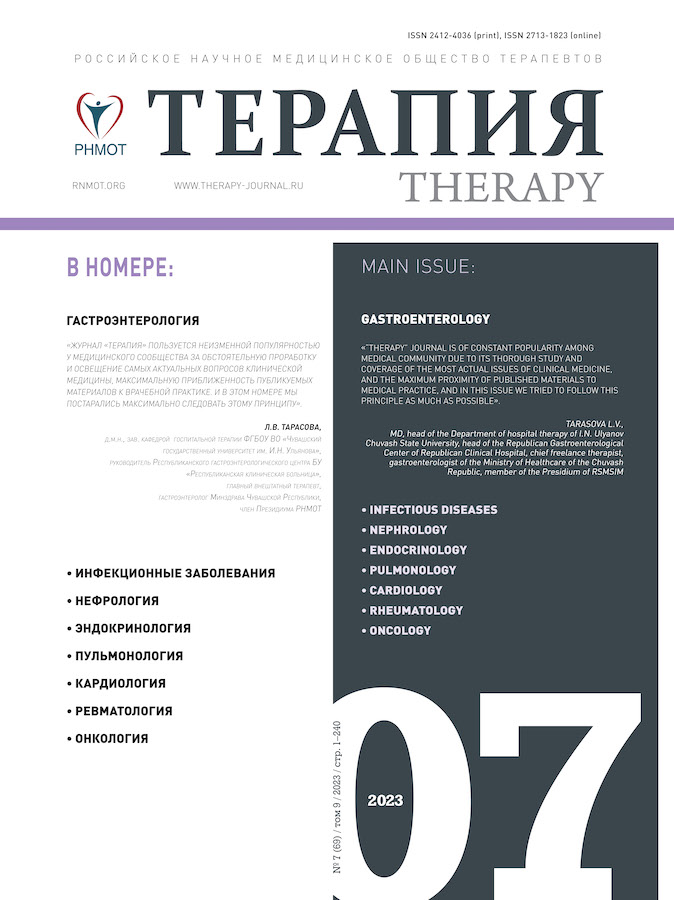Peculiarities of COVID-19 clinical course in patients with various rheumatic diseases
- Autores: Mukhamadieva V.N.1,2, Shamsutdinova N.G.1,3, Abdulganieva D.I.1,3, Adrakipov R.Z.3, Mukhina R.G.2, Dyakova E.V.3, Sukhorukova E.V.3
-
Afiliações:
- Kazan State Medical University of the Ministry of Healthcare of Russia
- M.N. Sadykov City Clinical Hospital
- Republican Clinical Hospital of the Ministry of Healthcare of the Republic of Tatarstan
- Edição: Volume 9, Nº 7 (2023)
- Páginas: 81-88
- Seção: ORIGINAL STUDIES
- URL: https://journals.eco-vector.com/2412-4036/article/view/625428
- DOI: https://doi.org/10.18565/therapy.2023.7.81–88
- ID: 625428
Citar
Texto integral
Resumo
Patients with immunoinflammatory rheumatic diseases are forming the risk group for COVID-19 severe clinical course.
The aim: to study the peculiarities of clinical course and outcomes of a novel coronavirus infection (NCI) in patients with rheumatic diseases (RD).
Material and methods. From March 2020 to February 2022 in the study were included 293 patients (77 males and 216 females) with significant RD and a history of COVID-19: 193 patients with rheumatoid arthritis (RA), 46 with ankylosing spondylitis (AS), 38 with psoriatic arthritis (PsA), 16 – with systemic connective tissue disease (SCTD). Average age of patients was 61,32 [55,25; 69], duration of RD at the moment of NCI – 14,06 [8; 17,5] years.
Results. Asymptomatic COVID-19 clinical course was fixed in 92 (31,4%), mild in 121 (41,3%), moderate in 59 (20,1%), severe in 21 (7,16%) patients. 201 patient had pulmonary damage of varying severity: CT-1 – in 94 (52,1%), CT-2 – in 69 (26,0%), CT-3 – in 22 (11,1%), CT-4 – in 16 (10,7%) cases. The study revealed the significant influence of coronary artery disease (post-infarction cardiosclerosis) and CHF at the increase in the volume of lung damage, as well as paroxysmal atrial fibrillation at the development of pulmonary fibrosis in COVID-19 case. From 293 patients, 37,1% required hospitalization in an infectious diseases hospital; 4,43% of NCI cases resulted in death. An increased risk of an unfavorable course of COVID-19 was associated with female gender, the presence of comorbid conditions and excess body weight, and the degree of activity of the underlying disease before infection with NCI.
Conclusion. The course of COVID-19 in RD patients is heterogeneous. A more severe course (CT-3–4) was more common in patients with CTD and RA. The type of RD therapy did not affect the severity of NCI, with the exception of rituximab use. High activity of RD before NCI and concomitant cardiovascular pathology play a significant role in the development of an unfavorable outcome of COVID-19.
Texto integral
Sobre autores
Venera Mukhamadieva
Kazan State Medical University of the Ministry of Healthcare of Russia; M.N. Sadykov City Clinical Hospital
Autor responsável pela correspondência
Email: venera.mukhamadieva@yandex.ru
ORCID ID: 0000-0002-2731-104X
postgraduate student of the Department of hospital therapy
Rússia, 420012, Kazan, 49 Butlerova Str.; 420103, Kazan, 54 M. Chuikova Str.Nailya Shamsutdinova
Kazan State Medical University of the Ministry of Healthcare of Russia; Republican Clinical Hospital of the Ministry of Healthcare of the Republic of Tatarstan
Email: ngshamsutdinova@gmail.com
ORCID ID: 0000-0001-7320-0861
PhD in Medical Sciences, associate professor of the Department of hospital therapy
Rússia, 420012, Kazan, 49 Butlerova Str.; 420064, Kazan, 138 Orenburgsky tract Str.Diana Abdulganieva
Kazan State Medical University of the Ministry of Healthcare of Russia; Republican Clinical Hospital of the Ministry of Healthcare of the Republic of Tatarstan
Email: diana_s@mail.ru
ORCID ID: 0000-0001-7069-2725
MD, professor of the Department of hospital therapy
Rússia, 420012, Kazan, 49 Butlerova Str.; 420064, Kazan, 138 Orenburgsky tract Str.Rifkat Adrakipov
Republican Clinical Hospital of the Ministry of Healthcare of the Republic of Tatarstan
Email: kancler@rkb.kgts.ru
rheumatologist
Rússia, 420064, Kazan, 138 Orenburgsky tract Str.Raviya Mukhina
M.N. Sadykov City Clinical Hospital
Email: gkb7@bk.ru
rheumatologist
Rússia, 420103, Kazan, 54 M. Chuikova Str.
Ekaterina Dyakova
Republican Clinical Hospital of the Ministry of Healthcare of the Republic of Tatarstan
Email: kancler@rkb.kgts.ru
pulmonologist
Rússia, 420064, Kazan, 138 Orenburgsky tractElena Sukhorukova
Republican Clinical Hospital of the Ministry of Healthcare of the Republic of Tatarstan
Email: kancler@rkb.kgts.ru
rheumatologist
Rússia, 420064, Kazan, 138 Orenburgsky tractBibliografia
- Kawano Y., Patel N.J., Wang X. et al. Temporal trends in COVID-19 outcomes among patients with systemic autoimmune rheumatic diseases: From the first wave to Omicron. medRxiv. 2022: 2022.06.19.22276599. https://dx.doi.org/10.1101/2022.06.19.22276599. Preprint.
- Насонов Е.Л. Коронавирусная болезнь 2019 (COVID-19) и иммуновоспалительные ревматические заболевания. Клиническая фармакология и терапия. 2021; 30(1): 24–29. [Nasonov E.L. COVID-19 and immune-mediated inflammatory rheumatic diseases. Klinicheskaya farmakologiya i terapiya = Clinical Pharmacology and Therapy. 2021; 30(1): 24–29 (In Russ.)].
- https://dx.doi.org/10.32756/0869-5490-2021-1-24-29. EDN: FQJRUM.
- Gianfrancesco M., Hyrich K.L., Al-Adely S. et al. Characteristics associated with hospitalization for COVID-19 in people with rheumatic disease: Data from the COVID-19 Global Rheumatology Alliance physician-reported registry. Ann Rheum Dis. 2020; 79(7): 859–66. https://dx.doi.org/10.1136/annrheumdis-2020-217871.
- Regierer A.C., Hasseli R., Schafer M. et al. TNFi is associated with positive outcome, but JAKi and rituximab are associated with negative outcome of SARS-CoV-2 infection in patients with RMD. RMD Open. 2021; 7(3): e001896. https://dx.doi.org/10.1136/rmdopen-2021-001896.
- Вахлевский В.В., Тыренко В.В., Свинцицкая И.С., Крюков Е.В. Особенности течения ревматических заболеваний на фоне новой коронавирусной инфекции. РМЖ. Медицинское обозрение. 2021; 5(2): 84–88. [Vakhlevskiy V.V., Tyrenko V.V., Svintsitskaya I.S., Kryukov E.V. Patterns of the rheumatic disease course in the setting of a new coronavirus infection. Russkiy meditsinskiy zhurnal. Meditsinskoye obozreniye = Russian Medical Journal. Medical Review. 2021; 5(2): 84–88 (In Russ.)]. https://dx.doi.org/10.32364/2587-6821-2021-5-2-84-88. EDN: VIYEHD.
- England B.R., Roul P., Yang Y. et al. Risk of COVID-19 in rheumatoid arthritis: A national veterans affairs matched cohort study in at-risk individuals. Arthritis Rheumatol. 2021; 73(12): 2179–88. https://dx.doi.org/10.1002/art.41800.
Arquivos suplementares













